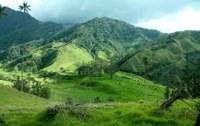In 2013 BP sold its Colombian operations to Equion Energía, which is comprised of Ecopetrol and Talisman energy (51% and 49% respectively). In December 2013 Talisman also sold 12.15 % of it's shares in the Oleoducto Central S.A. project, also known as OCENSA. The content of this article is directed against BP who will be brought to justice at the High Court of the U.K. for environmental damages.
BP sold its Colombian operations to Equion Energía, which is comprised of Ecopetrol and Talisman energy (51% and 49% respectively) for $1.9 billion dollars.
http://www.leighday.co.uk/News/2014/October-2014/BP-Faces-Trial-for-Environmental-Damage-in-Colombi
One of the largest environmental legal cases in UK legal history begins in London on Wednesday 15th October 2014 as Colombian farmers bring their legal fight against BP to the High Court.
The four-month trial will be the first time BP have faced the UK Courts over their business actions overseas and the first time compensation for environmental damage to privately owned land, caused by a UK oil company, has been litigated in the UK courts.
A British judge will be asked to assess whether BP breached agreements with Colombian farmers and were negligent in causing environmental damage to their farmlands due to the construction of the OCENSA oil pipeline across their private properties in the mid 1990s.
Lawyers for the 73 mostly subsistence farmers, known as ‘campesinos’, will argue that the British company Equion Energia (formerly BP Exploration (Colombia) Limited, or BPXC) negligently managed the construction of the OCENSA oil pipeline in Colombia during the mid 1990s - causing serious damage to their land.
They will also argue that they did not understand the import of the contracts signed with BPXC and that they did not receive full and fair compensation for environmental damage under those agreements.
The hearing in the UK’s Technology and Construction Court, part of the High Court, comes only one month after a US judge ruled that BP was “grossly negligent" in the run-up to the Gulf of Mexico disaster, where millions of gallons of crude were released into the Gulf, which could see BP facing costs of $17.6 billion US dollars in fines.
A number of witnesses will make the journey to London from remote rural parts of Colombia to give evidence in the trial including two claimants who will give their evidence in the week commencing 20 October.
Amongst those making the journey are Rogelio Velez Montoya and Rodrigo de Jesus Mesa Leon who allege damage to their farms caused by the construction of the OCENSA pipeline.
Banner-photo-Colombia.jpg
From L to R: Rodrigo Mesa Leon, Shubhaa Srinivasan, Rogelio Velez Montoya and Paula Atienza from Leigh Day
Mr Velez Montoya’s farm, La Nieve, is 47 hectares located in the municipality of Segovia, in the Department of Antioquia. This is a mountainous remote part of Colombia that has long suffered from violence and conflict. Mr Velez Montoya is illiterate and a traditional ‘campesino’ or subsistence farmer.
He inherited the land from his father and developed the farm himself, clearing forest and planting crops and pasture. He has a wife, 2 children and 3 grandchildren who he supports.
Mr Velez Montoya lived off his land. He practiced traditional style crop rotation, growing yucca, corn, rice and beans, and kept some cattle. He also harvested fruit and timber, kept hens and pigs and reared fish in a small fish pool. Mr Mesa Leon and his wife Mrs Arango Aguilar own a farm outside the town of Caucasia.
They have 3 grown children. The farm is approximately 38 hectares and has predominantly been used for traditional cattle rearing. The family live in Medellin city but Mr Mesa Leon manages the farm. It was used to support the family but it was also a place where the family spent recreational time together before the OCENSA pipeline was built. Some crops and fruit trees were grown and hens were kept. Fish were also reared and sold locally.
The OCENSA oil pipeline was a project undertaken by BP in the mid 1990s in partnership with Colombia’s national oil company and four other multinational European and Canadian companies after BP discovered more crude oil in the Cusiana-Cupiagua oil fields.
BPXC entered into contracts with the farmers to lay the pipeline through their private land. The farmers claim that the construction of the OCENSA pipeline has caused severe soil erosion and sedimentation of lower lying fields and water sources, reduced vegetation coverage and areas for pasture and blocked up vital water sources, thereby significantly reducing the productivity of their farms. Some farmers say sedimentation of wells meant they did not have a source of drinking water for some time and had to seek alternative sources which were often difficult.
The Court will hear claims that BPXC played a central role in the design, implementation and management of the project and the construction process and that it is therefore liable for the damage to their land.
The claims will be argued with reference to contractual and extra contractual liability under Colombian law.
In 2010 BPXC changed its name to Equion after BP sold off its shares in BPXC in the wake of the Deep Water Horizon disaster.
Shubhaa Srinivasan, the partner in Leigh Day's international claims team, who is representing the farmers, said: “At last the farmers are going to have a chance to tell their stories and to have their case decided. We feel it is really important that big companies are held to account for the way in which they undertake their activities abroad – especially when those activities take place in remote corners of faraway places out of the public gaze.”
